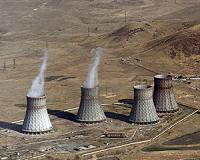 |
Manila (AFP) March 14, 2011 The leading proponent of introducing nuclear energy to the Philippines reversed his stand Monday in the wake of a potential nuclear disaster in quake-hit Japan. Mark Cojuangco, a cousin of President Benigno Aquino, said there was a need to rethink assumptions that nuclear power was safe following two explosions in three days at Japan's Fukushima plant. "In the light of Fukushima, I would like to say that now is the opportune time, the right time, for the whole world's nuclear power industry to be in a period of introspection," Cojuangco said in a statement. "Meaning, they should examine events like Fukushima and see if all the assumptions of safety of nuclear power are still valid, and if adjustments are to be made, what are they." Last year, while he was a member of parliament, Cojuangco lobbied heavily for the reactivation of a mothballed nuclear energy plant as a means to address the Philippines' perennial power outages. He authored a bill proposing the funding of a feasibility study to revive the Bataan Nuclear Power Plant (BNPP) which remains pending in the House of Representatives. "I am imposing upon myself a temporary moratorium on my advocacy for BNPP," Cojuangco, who remains a powerful political and business figure despite being forced from the legislature by term limits, said in Monday's statement. Located 100 kilometres (60 miles) north of Manila, the Bataan plant took the government of dictator Ferdinand Marcos eight years to build, at a cost of $2.3 billion, and was finished in 1984. Its construction was hounded by controversy and it has never produced a single watt of power. International safety inspectors who visited the plant shortly after Marcos was toppled by a "people power" revolt in 1986 declared it unsafe because it was built near a volcano and earthquake fault lines. President Aquino said shortly after taking office last year that his government was studying the possibility of tapping nuclear energy, although no firm commitments had been made. Aquino's spokeswoman, Abigail Valte, said on Sunday that now was not the time to discuss nuclear energy, while Japan was struggling with a potential meltdown. "That may be a heated debate," Valte said when asked about plans to revive the Bataan plant. "As of the moment, it is better to concentrate on other proposals like alternative fuels which are less controversial." strs-jvg/kma/slb
Share This Article With Planet Earth
Related Links Nuclear Power News - Nuclear Science, Nuclear Technology Powering The World in the 21st Century at Energy-Daily.com
 Nuclear contamination: The options
Nuclear contamination: The optionsParis (AFP) March 13, 2011 Evacuation, temporary shelter and iodine pills are the chief weapons for protecting civilians against nuclear fallout, experts say. A blast on Saturday that wrecked the concrete shell surrounding the No. 1 reactor at Japan's Fukushima nuclear plant released radioactive vapour but not at levels dangerous for human health, according to Japanese officials. Specialists say the authorities ha ... read more |
|
| The content herein, unless otherwise known to be public domain, are Copyright 1995-2010 - SpaceDaily. AFP and UPI Wire Stories are copyright Agence France-Presse and United Press International. ESA Portal Reports are copyright European Space Agency. All NASA sourced material is public domain. Additional copyrights may apply in whole or part to other bona fide parties. Advertising does not imply endorsement,agreement or approval of any opinions, statements or information provided by SpaceDaily on any Web page published or hosted by SpaceDaily. Privacy Statement |